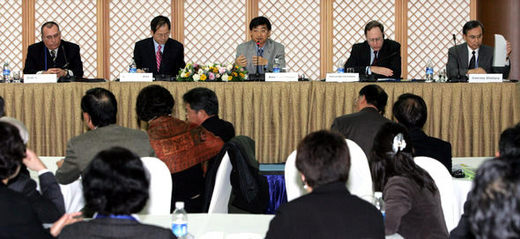 |
|
From left, Russia's Ambassador Gleb Ivashentsov, Top Korean envoy for the six party talks Chun Young-woo, professor of Kyungsung University Ahn Chul-hyun, the U.S. Ambassador Alexander Vershbow and Japan's Ambassador Oshima Shotaro.
|
Japan, U.S. seek further pressure on N.K., while Russia, S.K. ask that UN resolution 'not be misinterpreted'
South Korea's chief negotiator at the six-party talks on North Korea's nuclear program, Chun Young-woo, exchanged opinions with ambassadors from the United States, Japan, and Russia at the second day of the Hankyoreh-Busan international symposium in Busan on November 25. Chun, U.S. ambassador to South Korea Alexander Vershbow, Japanese ambassador to South Korea Oshima Shotaro, and Russian ambassador to South Korea Gleb Ivashentsov shared their stances on how to resolve North Korea's nuclear standoff. The four diplomats agreed that their governments cannot recognize North Korea as a nuclear state, and that their top priority is to persuade North Korea to give up its nuclear weapons program. However, they remained divided over how to implement sanctions against North Korea. The U.S. and Japan emphasized that sanctions should be strongly implemented on Pyongyang, while Ambassador Ivashentsov urged nations not to too widely interpret the U.N. Security Council resolution -- or things would get worse, he said. At first, Ambassador Vershbow accused North Korea of breaching three pledges: a joint denuclearization statement on the Korean peninsula in 1992, a basic agreement between North Korea and the U.S. in 1994, and the September 19 Joint statement in 2005. We need a stick as well as a carrot, Ambassador Vershbow said, his remarks mirroring the U.S. stance that North Korea should take responsibility for the stalemate of the six-party talks. Ambassador Vershbow then urged nations to take joint action to support the U.N. resolution against North Korea and the U.S.-led program to block the proliferation of weapons of mass destruction, the Proliferation Security Initiative (PSI). Vershbow said that it is no longer a surprise that China, who fought against the U.S.-led UN forces in the Korean War, has taken the same approach as the U.S., South Korea, Russia, and Japan in dealing with the North, referring to China's signing of the UN Security Council resolution after the North's test as well as enforcing several sanctions against the North. If the six-party talks resume next month, North Korea should attend the talks after preparing to implement the September 19 Joint Statement, Vershbow said, putting pressure on North Korea indirectly. If North Korea is ready to keep its promise, we will be ready to implement our pledge, he said. Through the progress of denuclearization, he continued, a permanent peace treaty is possible in the Korean peninsula. This last remark echoed U.S. President George W. Bush's gesture of appeasement during his meeting with South Korean President Roh Moo-hyun during the Asia-Pacific Economic Cooperation summit in Hanoi, in which President Bush also alluded to a possible peace treaty to end the Korean War, locked in a truce since 1953. At the November 25 Hankyoreh-Busan symposium, Ambassador Oshima also put his focus on implementing sanctions against North Korea. He called North Korea's missiles and nuclear test a huge security threat against Japan, Northeast Asia, and the world, and a breach of the overall principle of banning the proliferation of weapons of mass destruction. Japan is aggressively cooperating with related nations and the U.N. Security Council, he said. In response, Chun stressed the South Korean government's stance that sanctions are a means to an end, not a goal. Ambassador Ivashentsov said that U.N. Security Council Resolution 1718, signed in response to the North's nuclear test, only bans the transaction of technology for nuclear weapons and affiliated transport and supplies. Related nations should not widely interpret the resolution, he said. The U.N. resolution was not aimed at punishing North Korea, but was rather a precautionary measure because there is no other means available, Ambassador Ivashentsov said.Referring to the matter of frozen North Korean accounts in Macau-based Banco Delta Asia, one of the most difficult issues facing the six-party talks, Ambassador Ivashentsov said that the financial matter took place without relation to the six-party talks, and should be resolved independently. Under the current circumstances, he said, talking about the sanctions in relation to the talks is irresponsible and both sides should show flexibility on the matter. Ambassador Vershbow countered that the U.S. cannot ignore counterfeiting and human rights abuses in North Korea. In the case of financial sanctions, said the U.S. ambassador, there will be a variety of ways to deal with them, such as working-level meetings during the six-party talks. Ambassador Oshima commented about issues related to North Korea's abduction of Japanese citizens as well as human rights matters in the North, saying that Pyongyang is not sincerely dealing with the abduction issue, and that international society's countermeasures are needed. However, other ambassadors did not bring up the matter of North Korea's abduction of citizens. Ambassador Ivashentsov gained attention by expressing his opinion from the point of view of North Korea. A small country will not be in search of weapons of mass destruction for its security if an international security guarantee that the country could trust is made, he said. North Korea should receive equal status as a participant and not feel alienated from the other parties in order for the six-party talks to not be deadlocked, he continued. Please direct questions or comments to [englishhani@hani.co.kr]






